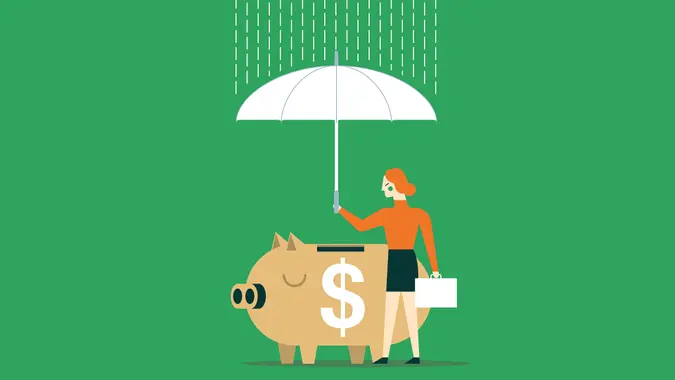Why You Need an Emergency Fund To Protect Your Retirement Funds

Commitment to Our Readers
GOBankingRates' editorial team is committed to bringing you unbiased reviews and information. We use data-driven methodologies to evaluate financial products and services - our reviews and ratings are not influenced by advertisers. You can read more about our editorial guidelines and our products and services review methodology.

20 Years
Helping You Live Richer

Reviewed
by Experts

Trusted by
Millions of Readers
An emergency fund is an important way to safeguard against unexpected expenses, income loss and emergencies. It can also help to protect your retirement funds in those years when you likely are living on a fixed income and a tighter budget.
When unexpected expenses arise and you’re forced to withdraw from your investments, it can be detrimental, especially if the market is down, according to Hazel Secco, CFP, CDFA, president and founder of Align Financial Solutions, LLC.
“Selling investments during a market downturn means you may need to achieve higher returns to recover your original principal, making it challenging to regain lost ground,” she said.
Financial experts explain why you need an emergency fund to protect your retirement funds:
The Amount May Vary
The size of your emergency fund should be tailored to your individual circumstances, Secco explained. “Whether you’re a business owner or facing frequent unexpected expenses, it’s wise to have more than the recommended three to six months’ worth of expenses set aside. Ensuring you have an appropriate emergency fund in place can provide peace of mind and protect your retirement savings in times of need.”
To Bridge the Gap
Having an emergency fund can allow you to not have to tap into retirement funds or Social Security benefits before the age of 59 ½, Secco said. Plus, early distributions may not maximize the benefits of tax deferral.
“Retirement savings typically grow tax-deferred or tax-free,” she explained, “but to fully leverage these benefits, long-term investment is essential.”
Avoiding Early Withdrawal Penalties
Garrett Smith, a financial advisor, CCO and business partner at Ascend Investment Partners, agreed that an emergency fund can keep you from incurring early withdrawal penalties.
“[Penalties] typically apply to withdrawal from retirement accounts prior to the age of 59 ½ and can erode a substantial portion of your savings,” he said.
Preserving Compound Growth
Additionally, Smith pointed out that over time, retirement accounts accrue compound interest that you don’t want to prevent by withdrawing too soon.
“Performing withdrawals from these accounts would disrupt the compounding mechanism, which could potentially hinder the expansion of your retirement savings. By shifting your focus to an emergency fund, you ensure that the growth of your retirement funds remains uninterrupted.”
Liquidity Bucket
Loren Fiffik, a CFP with Confluence Financial Partners, suggested it might be easier to think of an emergency fund as a “liquidity bucket.”
“This component of the portfolio for capital preservation should consist of assets that don’t have much volatility risk or correlation with growth assets. These can include cash, money markets, short term fixed income and insurance products,” Fiffik explained.
This helps investors weather the cyclical downturns by providing access to cash from this bucket when they need it without selling their growth assets — such as stocks — at a potential loss.
How To Use It
Fiffik explained the best way to use your liquidity bucket to protect your retirement savings: “Each time the market experiences a 20% draw down, investors switch from sourcing income from capital growth and begin taking it from the liquidity bucket. Then, during periods of market recovery, rebalance the portfolio and capture market gains from the equities to refill the bucket for the next cycle.”
Fiffik is more aggressive in how much should be saved in this bucket; he suggested two to three years’ worth of income needs.
“This bucket encourages more patience with their overall portfolio and ensures that they will not be in a situation that forces liquidation of growth assets at significant discounts,” he said. “Never having to sell stocks during a major decline allows the investors to fully participate in the eventual recovery.”
He recommended putting any unexpected cash or windfalls — such as a tax refund — into this bucket, as well.
Mitigate Market Volatility
Another reason to use an emergency fund is that retirees can’t control what the economy is doing when they are finally ready to retire.
Smith explained, “In periods of economic recession, withdrawing funds from retirement accounts at a discount can result in irrecoverable losses.”
Thus, having an emergency fund enables one to “withstand transient financial setbacks without being compelled to liquidate investments prematurely,” he said.
Regularly Replenish
Just because your retirement accounts grows over time through interest accrual doesn’t mean you should stop contributing to it, Smith urged.
“Prioritize the development of your emergency fund financially. Maintain consistent contributions to it,” he said. “Constant replenishment guarantees that one is ever-ready to confront unforeseen expenditures throughout their lifetime.”
Don’t Forget To Budget
Also, remember that your emergency fund isn’t a replacement for good financial habits like budgeting, Smith said.
“Strive to adhere to rigorous budgeting principles and reside in a modest manner. This practice not only increases the amount of money that can be directed towards an emergency fund but also decreases the probability of having to withdraw funds from retirement savings to cover discretionary costs,” he said.
Build Emergency Funds Near Retirement
If your emergency fund isn’t as robust as you’d like near retirement, Michael Ryan, a retired financial planner and finance expert with Michael Ryan Money, urged, “Trim expenses wherever possible to direct more cash towards urgent savings goals.”
You might even want to consider part-time work to generate additional emergency fund income quickly, he said, and seek the assistance of a financial planner. “In my decades of experience, proactively saving for the unexpected allows seamless weathering of surprises without raiding retirement funds.”
 Written by
Written by  Edited by
Edited by 

























